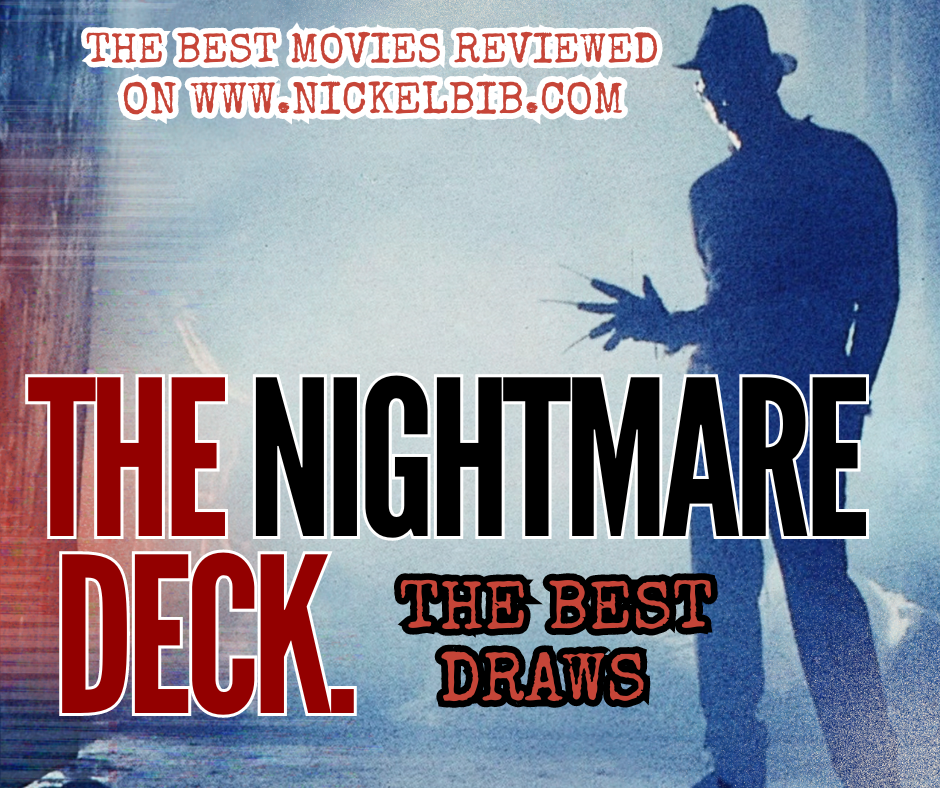Four years after The Hills Have Eyes, Wes Craven continued his directing career with a film I had never heard of or though about prior, a slasher film called Deadly Blessing. Although I think it can be argued that The Hills Have Eyes had the DNA of a slasher film in its hardwiring, Deadly Blessing is the first film of his catalogue to be hailed as within the subgenre. Unlike his earlier films, Deadly Blessing had a more proper budget of around 3 million and the familiar face of actress Sharon Stone. The story comes from Glenn M. Benest and Matthew Barr, with screenwriting credits shared between them and Wes Craven.
I am not familiar with either, but I am curious about what differences will arise from more cooks in the kitchen and if I’ll be able to notice elements that can be distinguished as being by Wes Craven’s hand. If a woman is raped or the antagonist trips on a spilled bag of marbles, I imagine that’ll be his doings.
Before we talk about the film, I want to commend the free streaming service Tubi TV and how easily they have made revisiting each film. The Last House on the Left, The Hills Have Eyes, and now, Deadly Blessing, have all been available on their streaming service and I’m fairly happy about that. As a service, Tubi TV may have one of the absolute worst categorization systems I’ve ever seen, acting as a glorified dumpbin for films, but, boiled down to it, I’d actually offer it the highest recommendation to any horror fan, perhaps even more than Shudder pound-for-pound. I know none of us are a huge fan of sitting through ads, but I still am highly fond of it.
It’s a new decade for Wes Craven and for cinema as we step into the eighties – as the film begins with a black-and-white scene and a title card like something straight out of a 60s Hammer Horror film. I don’t have any issue with that, mind you, although I will say I caught whiplash with the very first shot of this film.
The theatrical release poster for Deadly Blessing shows a woman in bed, moaning while the hands of a man, perhaps even a wolfman, creep in. The artwork highlights her bust and comes off like something I would’ve mistaken as an erotic-thriller at first glance, or, at the very least, a slasher film meant to appeal to really appeal to the male demographic, like a lot of the slashers released in the eighties. The old-timey village aesthetic wasn’t something I expected.
As the film unfolds, we’re led in on the central premise that binds it all together. Martha and Jim live on an isolated farm, with their neighbors being “Hittites,” which can best be described as not Amish, but pretty close to Amish. I looked into it, and from what I can tell, Hittites are actually long-since extinct, having not been around since 1200 BC, with some tribes still existing that identify as such. I’m not certain exactly why it was decided to include them, instead of simply calling them Amish, maybe it’s because they wanted the leeway of being able to pull from history but it not matter much if they were an actual authentic portrayal.
The Hittites have a lot of issues with Martha and Jim, largely because they use tractors and more advanced farm equipment and that’s a major bummer when you’re mowing your hayfields with a scythe. Pluto from The Hills Have Eyes is in the film and he’s a dick, harassing women and causing mischief.
Everything takes a dark turn when farmer Jim is killed while in his shed by his tractor, Christine-style. In death, we learn more about Jim’s relationship with the not-Amish, how he inherited his farm and had once been a member of their village before being disowned for disavowing their way of life. They refer to his wife Martha as an incubus, believing she seduced him to the ways of evil.
Part of the reason I made a commitment to watch all of Wes Craven’s filmography was as a challenge to myself. As I’ve gotten older, my responsibilities have changed and I’ve changed, I’m a husband now and I have all of these ambitions I want to achieve and requirements I’m expected to meet. This challenge to myself was a refusal to lose a part of myself – my love and affection for horror cinema. If you haven’t made a blood oath to the devil to watch all of Wes Craven’s films, however, you might find yourself wondering whether Deadly Blessing is a film worth revisiting for enjoyment’s sake.
Let me say, straightaway, this is a dull, dull film. It isn’t a decision Wes Craven may’ve made, I don’t believe, although I suspect Michael Berryman’s portrayal as a creepy, Peeping Tom likely had to do with Wes, if his prior films are any indication. Instead, it’s largely to do with the script and one’s ability to squeeze water from a stone, so to speak. It isn’t like The Hills Have Eyes where the first half felt like it meandered and spun its wheels to fill the requirement of feature length, a lot happens in Deadly Blessing. None of it, however, is interesting whatsoever.
The film has some newer ingredients in it – the score, for instance, feels more like a lot of other films that were released in the period. The vaguely eerie sound preluding what sounds like someone beating their head against the keys of a piano. Other than that, I’m actually otherwise complimentary about it. It isn’t anything to write home about, but the sound-work is solid, present, and does benefit the film.
In one shot, Martha lays in a bathtub with the camera filming from between her legs – an early predecessor to the famous scene from Wes Craven’s A Nightmare on Elm Street.
The characters are about as engaging as an old dish towel. I did my best to approach it with an open mind, even when the premise unveiled itself. Hearing the same not-Amish man monologue on and on about how Martha was an incubus and the oncoming wrath that’d fall upon them, I couldn’t stay engaged. The characters are about as interesting as sand and the whole film amounts to an utter slog from start to finish.
I feel like a lot of the wind was taken out of my sails by this film. I no longer try to do negative reviews on the Nightmare Shift. I mean, obviously, I’ll come across the occasional film I dislike or was disappointed in, but, normally, I do my best not to bash a film, unless it actively offends me. The philosophy I have adopted is that I don’t say anything about a film that I wouldn’t say to the screenwriters, director, actors, etcetera. This film doesn’t offend me in that way – a way where I think everyone involved doesn’t care or isn’t trying, and so, I still won’t bash it, of course. However, Wes Craven’s Deadly Blessing may very well be one of the most absolute boring films I’ve seen in years.





